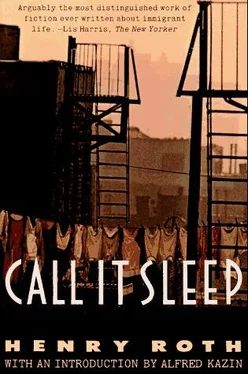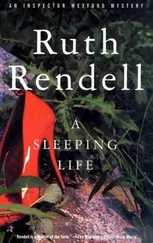“Ach! You were mad.”
“But that was only a taste. You don’t know how mad I was—” Her voice took on a throbbing richness now that David had never heard in it before. The very sound seemed to reverberate in his flesh sending pulse after pulse of a nameless, tingling excitement through his body. “Day grew worse than darkness. I welcomed the light only when some Polish townsman died — You recall the priest and the banners and the funeral procession that went through the town? Ludwig was always in the train, chanting the services. I could watch him then as he went by, follow with the others a little ways, stare at him unafraid, Love—”
With the same suddenness as before, meaning scaled the horizon to another idiom, leaving David stranded on a sounding but empty shore. Words here and there, phrases shimmering like distant sails tantalized him, but never drew near.
He writhed inwardly at his own impotence.
It seemed to him, lying there almost paralyzed with the strain, that his mind would fly apart if he brought no order into this confusion. Each phrase he heard, each exclamation, each word only made the tension within him worse. Not knowing became almost unbearable. He felt as if nothing he had ever known were as important as knowing this. Who was Ludwig? Was that he, the goy! Why was he at funerals? What did she mean when she let a word drop about wicker baskets? Attics? Letters? Mere curiosity had petrified into obsession. But still the phrases flickered on as ephemeral and capricious as before, as thwarting — the abrupt and fragmentary glimpses of a figure passing behind the brief notches of parapets.
“And the welcome over … And mother also downcast … But too deep in joy to notice … These things,” she tapped her brow, “they wait their time inside one’s head … Stone under water till the eddies rest … And I sought him … Nowhere … And I remembered it … one glance would comfort me … The attic stairs … And on my nails across the loose boards … The wicker basket lay … Safe I thought … Carefully!” Her clenched hands went up as though she were lifting a heavy lid. “You know how wicker creaks—”
Her sudden, involuntary gasp was like a steep, sheer drop in the level-flowing matrix of her speech. Her hand went to her lips. The horror that came into her face was such that it seemed to David not something thought or remembered, but something she beheld this moment, something present in this very room. A shudder ran through him, watching her, “The light before my eyes grew black! Dear God! There on the very top of the pile of coats lay the portrait. Gazing up at me, there on top!”
“They knew,” Aunt Bertha exclaimed.
“They knew,” his mother repeated.
“But how?”
“I found out later. I had forgotten that mother went through the trunk every summer with camphor.”
“While you were away?”
“No. Before. They sent me away because they knew.”
“Ah!”
“My despair then! My shame! You wouldn’t know unless you had felt it. There are no words. I thought I should faint. I picked up the portrait — They had read the back no doubt. They knew all. Had I—”
And again his mother’s eyes met his and again her speech changed abruptly. David rose to his feet. He couldn’t bear it any longer, this suspense, this waiting for significance to cut the surface like momentary fins of sunken shapes. He was going down, that’s what he was going to do. He wouldn’t listen a moment longer. And if the time came when he knew something they didn’t know, he’d pay them back in the same coin. He’d learn to talk the way the girls talked in the street — alligay walligay. Look at them! They weren’t even noticing him they were so engrossed. Even when he stood up and stared at them, no one paid any attention to him. They wouldn’t even know he had gone into the front room to get his coat. They wouldn’t even know he had gone. No! Then he wouldn’t say goodbye. That’s what. He’d just go down without a word.
He went petulantly into the front room and found his coat. But as he put it on, frustration forced a cunning thought into his brain. He would sit here and wait. He’d give them their last chance. If they didn’t know where he was, perhaps they’d speak in Yiddish again. With the door open between them, he could hear in the front room as well as he could in the kitchen. He sat down stealthily beside the doorway and listened. But even though he was out of her sight, his mother seemed not to realize it. The significance of what she said still continued to be fragmentary.
“Must see him…” The words and phrases pulsed out as before. “Comfort … On the church step … She held both … Fluttered her parasol … Ogled him like a lamp … Lace, elegant ribbons … But old, as I say … Gave her no thought … Finally … And parted … Crossed his path … He followed … Waited among the trees…”
Trembling with silent fury and despair he was about to give up. She would never speak. There was no use waiting, no use hiding. He would hear nothing. But as he pushed himself to his feet, Aunt Bertha’s impatient voice interrupted his mother’s—
“Who was this woman? Speak. Do you know? I’m curious.”
“She? I was coming to that.” This time his mother’s words were entirely in Yiddish and completely intelligible. “When I told him what had happened, that they knew, that I was willing to follow him to the corners of the world, he answered — What folly! Don’t you ever think beyond the morrow? How can I marry you? Where will we go? With what? And he was right. Of course he was right!”
“He may have been right,” Aunt Bertha spat out vehemently. “But cholera choke him anyway!”
He had sat down and now was secretly hugging himself in guilty elation. They had forgotten about him. They had! He pressed closer to the wall and prayed his mother would go on speaking in Yiddish. She did.
“Anywhere, I said. I’m ashamed to tell you, Bertha, but it’s true. I said I’d go with him just as he saw me.”
“What a fool you were!”
“Yes. That’s what he said also. A love affair is one thing, marriage another. Didn’t I understand? I didn’t. I’m already engaged, he said.”
“She!” Aunt Bertha exclaimed. “That older woman you spoke of?”
“Yes.”
“Did you spit in his face?”
“No. I stood like one frozen. You love her, I asked? Bah! he said. Could I? You saw her! I may as well tell you. She’s rich; she has a dowry. Her brother is a road-engineer, the best-known in Austria. He’ll provide the rest. As for me, I’m poor as the dark. All I could ever hope to be is a threadbare organist in a village church. And I refuse. Do you understand? Surely you yourself wouldn’t wish that fate on me! But listen, he said and tried to seize me in his arms. We can go on again. In a little while, after this cursed marriage is over, we can go on again, just as we are. Be just what we’ve always been to each other. No one need know! I pushed him away. Does this make so much difference to you? he asked. Because I must marry? Will you now tear out all the love you held for me?
“I don’t know why? I can’t tell. But suddenly I began to feel like laughing. It was as though everything inside of me were lifting up with laughter. By the mad smile on my face, he must have thought I was yielding, for he seized my arm and said: Look at me Genya! Forgive me! See how poor I am! I haven’t even the clothes decent enough to marry in. Genya, I’ll repay you. Get me the cloth as you love me! Your father’s store! A little while and we’ll be together always!
“How shall I put it into words — the fullest cup of death! It seemed to me that heaven and air were filled with laughter, but strange, black laughter. God forgive me! And words I heard, gnashing in it like teeth. Strange words about roses! I came running, I came running with flowers! Like a child! Good-bye and good-bye! Madness, I tell you Bertha, sheer madness!
Читать дальше












